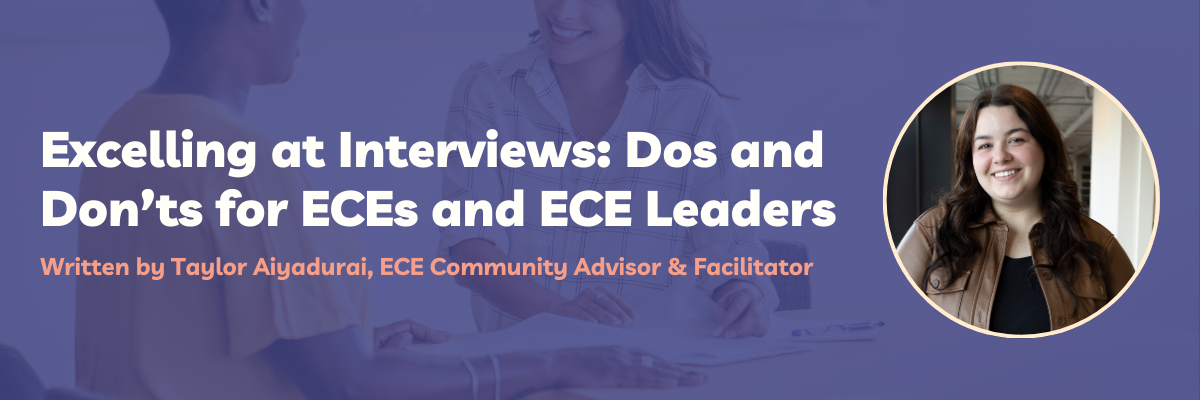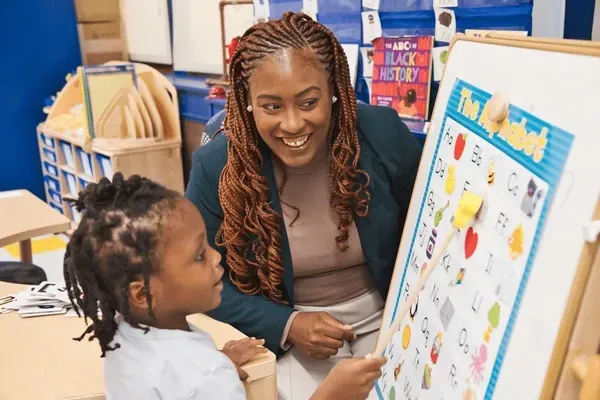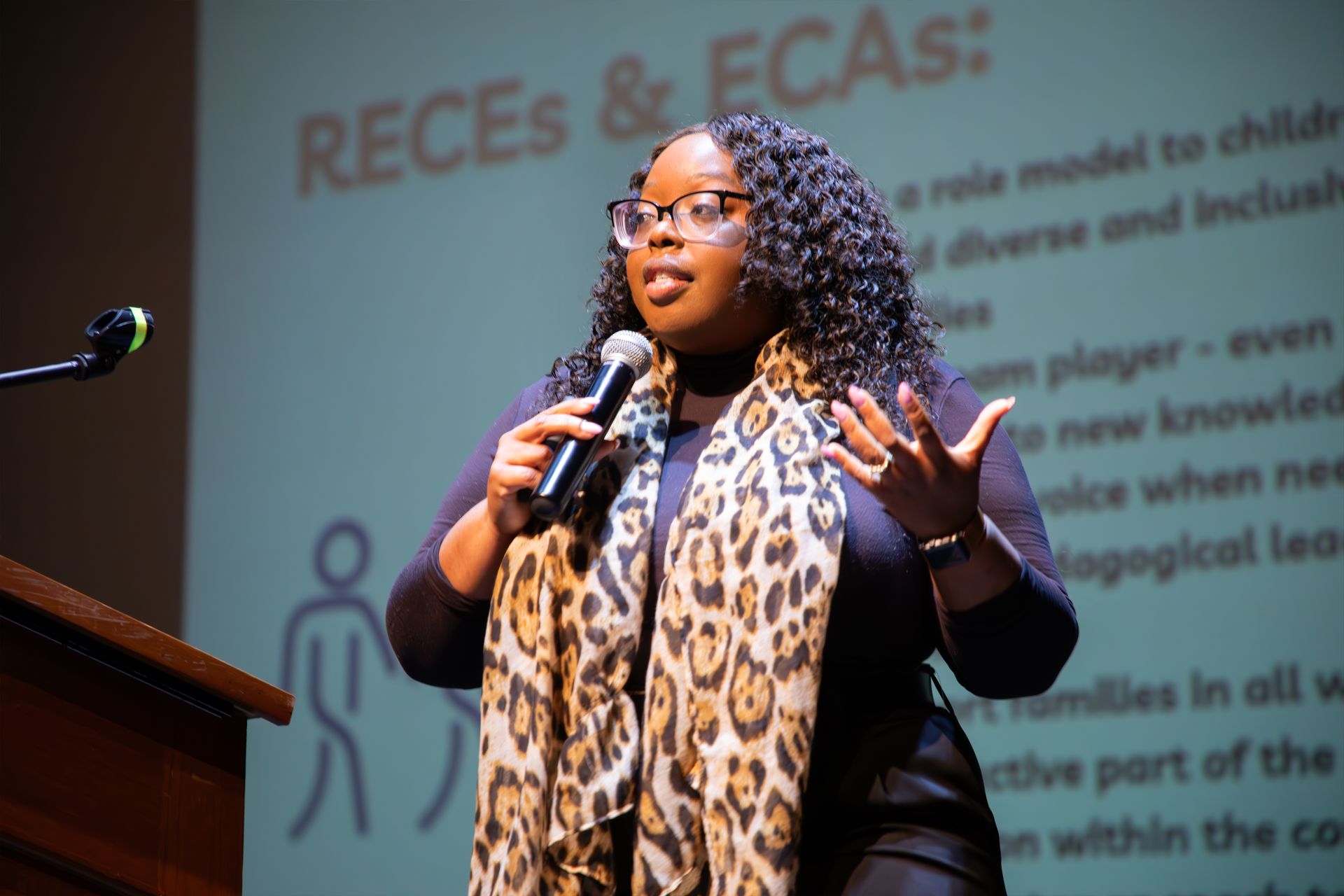Excelling at Interviews: Dos and Don’ts for ECEs and ECE Leaders


Dos:
Research the Organization: Research is key. Before your interview, spend some time understanding the organization you're applying to. Review their mission, values, and educational philosophy to get a true sense of what they want in a potential candidate. Tailor your responses during the interview to align with their goals and demonstrate your commitment to their vision. Spending enough time on research will give you the confidence to put your best foot forward during the interview.
Prepare Specific Examples: Be ready to share concrete examples from your past experiences that highlight your skills and accomplishments. Whether it's implementing a successful curriculum, managing a challenging classroom situation, or leading a team project, providing specific instances will showcase your capabilities effectively.
A good trick is to prepare a set of responses for potential scenarios they could ask you about. Doing some prior research about interview questions helps with this. Once you know what you want to talk about, you can always tweak it in any way that’s necessary during the interview.
Showcase Your Communication Skills: Effective communication is essential in the field of early childhood education. During the interview, demonstrate your ability to communicate clearly and effectively with children, parents, and colleagues. Emphasize your active listening skills and your capacity to collaborate with others to create a supportive learning environment.
An active, empathetic communicator is always an asset to any organization. Your goal during the interview is to let the employer know that you will be able to enhance the lives of your students and their caregivers through your reliable communication skills.
Highlight Your Leadership Abilities: If you're applying for a leadership position, highlight your leadership skills and experiences. Discuss how you've mentored and supported other educators, led professional development sessions, and implemented innovative initiatives to enhance the quality of early childhood education. Don’t be afraid to let them know how good you are! An interview is a space for you to showcase all your achievements and let your employer know that you are proactive and have the skills to lead a classroom.
Ask Thoughtful Questions: Towards the end of the interview, don't hesitate to ask thoughtful questions about the organization, the role, and the team you'll be working with. This demonstrates your genuine interest in the position and allows you to gather valuable insights to help make an informed decision if you receive an offer. This also ties back to our first point about research, good research will always help you ask thoughtful questions.

Don'ts:
Don't Oversell Yourself: While it's important to highlight your strengths and accomplishments, avoid exaggerating or overselling yourself during the interview. Be authentic and honest about your skills and experiences, and focus on providing genuine examples that demonstrate why you’re the right fit for the role. Don’t fabricate information, stick to facts that showcase your potential.
Don't Speak Negatively About Past Employers: Even if you have faced challenges in previous roles, refrain from speaking negatively about past employers or colleagues during the interview. Instead, spend time discussing what you have learned from those experiences and how they've contributed to your professional growth. Stay positive during the interview process and focus on what you have to offer the organization instead of dwelling on unpleasant experiences from the past.
Avoid Being Overly Nervous: It's natural to feel nervous before and during an interview but try not to let your nerves overshadow your capabilities. Practice relaxation techniques such as deep breathing or visualization to help calm your nerves and maintain your confidence throughout the interview. You could also spend some time rehearsing your answers in front of a mirror to get a sense of what you will sound like. Remember that you’re a capable professional with the right skill set and that’s exactly what a potential employer is looking for.
Don't Forget to Follow Up: After the interview, don't forget to send a thank-you email to the interviewer expressing your gratitude for the opportunity to meet with them. Use this to reiterate your interest in the position and briefly summarize why you're a strong candidate. This small act sends a positive message to the employer and creates a good impression. Leave no stone unturned!
Don’t Neglect Your Professional Appearance: Finally, make sure to dress professionally and present yourself in a polished manner during the interview. Your appearance reflects your professionalism and respect for the opportunity, so dress appropriately for the role and the organization. If it’s a virtual interview, ensure you’re seated in a well-lit area and blur your background, so you can be the focus. Dressing professionally for a virtual interview is just as important!
Mastering the interview process is essential for early childhood educators and leaders seeking new roles. By following these dos and don'ts, you can confidently navigate the interview process and showcase your skills effectively. Remember to stay authentic, prepared, and professional throughout the process, and you'll be well on your way to securing a dream job in the early childhood education field!
Additional Reading & Resources
There are several websites that can provide valuable resources and support for early childhood educators and leaders preparing for job interviews. Here are a few:
National Association for the Education of Young Children (NAEYC): NAEYC offers a wealth of resources for early childhood educators, including articles, webinars, and professional development opportunities. Their website also features tips and guidance for job seekers in the field of early childhood education.
Early Childhood Education Degrees: This website provides comprehensive guides and articles on various topics related to early childhood education, including career advice, interview tips, and strategies for professional growth. They offer insights specifically tailored to educators seeking leadership roles in the field.
https://www.early-childhood-education-degrees.com/
Teach Early Years: Teach Early Years is a UK-based website that offers a variety of resources for early years educators, including articles, lesson plans, and professional development opportunities. Their website includes tips and advice for job seekers in the early childhood education sector.
https://www.teachearlyyears.com/
Education Week: Education Week is a trusted source of news and information on education-related topics. Their website features articles and opinion pieces on early childhood education, including tips for job interviews and insights into current trends in the field.
Indeed Career Guide: Early Childhood Education Careers: Indeed, a popular job search website, offers a career guide specifically focused on early childhood education careers. This guide includes information on job opportunities, salary expectations, and tips for success in the field.
https://www.indeed.com/career-advice/career-development/early-childhood-education-careers
ChildCare Careers Blog: ChildCare Careers is a staffing agency specializing in early childhood education. Their blog offers articles and resources on topics such as resume writing, interview preparation, and career advancement in the early childhood education sector.
https://www.childcarecareers.net/blog/
Explore these websites during your research process to access valuable information, tips, and resources to support you in your job search and interview preparation process. You got this!
References:
Smith, J. (2020). "Effective Communication Strategies for Early Childhood Educators." Journal of Early Childhood Education, 25(2), 87-102.
Johnson, L. (2019). "Leadership in Early Childhood Education: A Practical Guide." New York: Routledge.
Interview Tips for Educators. (n.d.). Retrieved from https://www.edweek.org/teaching-learning/opinion-tips-for-educator-job-interviews/2018/03





